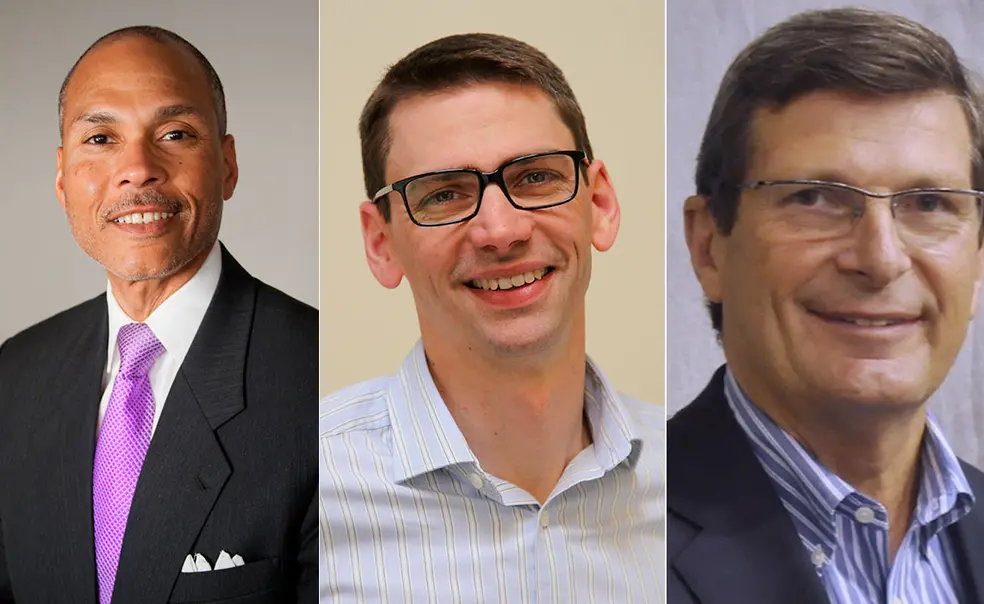The Olympic athletes featured in our Road to Rio series are not the only Princetonians preparing for the summer games. Read about three alumni who lead organizations that support Olympic athletes: Donald Anthony ’79, president and chairman of the board of USA Fencing; Derek Bouchard-Hall ’92, CEO of USA Cycling; and Dale Neuburger ’71, a vice president of FINA, the international swimming federation.
Donald Anthony Jr. ’79 started fencing at age 7, at a community center in Cleveland, but had to drop the sport temporarily when his family moved to Cincinnati. When he came to Princeton as an undergraduate, he returned to fencing and grew to become an international competitor. Anthony says he was drawn to the sport because it is “both physically demanding and mentally challenging.”
In 2000, Anthony began working with USA Fencing, the sport’s national governing body, and he was selected to become president and chairman of the board in 2012. His key responsibilities include finances, governance, setting a vision for the organization, and empowering people to execute that vision.
Performance at the Olympics is a key measure for USA Fencing: National team athletes are “your face to the world,” Anthony says, and the United States has developed into a major player internationally. But medals are not the only reward. Anthony also loves to hear from parents about how much their children get from their experiences in the sport, or from veteran fencers rekindling their interest in training and competing.
Anthony’s USA Fencing colleagues include two Princetonians who overlapped with him in the fencing room at Jadwin Gym: Jim Neale ’77, who serves as the organization’s general counsel, and Diana Hoadley ’81, an independent director on the board.
While Anthony is looking forward to Rio, he’s also excited to be returning to the NCAA Championships, where he’s served as a broadcaster in recent years — a job that can be difficult when Tigers are competing on the strip. “I have to curb my enthusiasm,” he says with a laugh.
Derek Bouchard-Hall ’92’s life in cycling began with a casual visit to the freshman activities fair at Dillon Gym, where he first met members of Princeton’s club team. After a successful experience as an undergraduate, he continued to compete in graduate school at Stanford, where he studied engineering. He was invited to join an elite amateur team the summer after he completed his master’s degree, and that experience blossomed into a nine-year run on the amateur and pro circuits, including a trip to the 2000 Olympics in Sydney, Australia.
After retiring from the sport, Bouchard-Hall went to Harvard Business School and began working in consulting. But he stayed connected to cycling and eventually went to work for the UK-based cycling retailer Wiggle. Last year, USA Cycling hired Bouchard-Hall as its new CEO.
USA Cycling’s charge is to develop the sport of cycling in America, serving a membership that ranges “from everyday racers to elite athletes,” Bouchard-Hall says. In his first months on the job, he has been excited to see just how passionate the amateur cycling community in the United States has become.
The organization’s challenges include setting — or re-setting — the culture in a sport that has been plagued by doping in recent years. USA Cycling has increased funding for testing on the amateur level, to make it a credible threat, and is working to educate racers on exactly what they can and cannot take. “We’re quite willing to talk about what we’re doing to fight doping,” Bouchard-Hall says.
Looking back, Bouchard-Hall says, he never could have envisioned that his time on the Princeton cycling team would start him on a road to one of the top administrative jobs in the sport. “That’s the magic of a place like Princeton,” he says. “You never know what you’re going to pick up and latch onto.”
Dale Neuburger ’71 was, in his own words, “an average swimmer on some great teams” at Princeton. But the experience left a lasting impression. Neuburger coached swimming after college and eventually became the aquatics administrator for the public schools in Syracuse, N.Y., which had the first 50-meter high school pool in the country. That job provided an entrée into facilities management and, eventually, the world of international swimming.
A longtime USA Swimming board member and former United States Olympic Committee representative, Neuburger has been a vice president of FINA, the international swimming federation, since 2000. He also serves as president of Union Americana De Natacion (UANA), which governs swimming, diving, water polo, and other water sports in the Americas.
At the Rio Olympics, Neuburger will be the technical delegate for FINA, which means he’ll be “15 feet away from the start and finish of every race,” overseeing the competition. The goal, he says, is to create an environment where athletes can achieve their best performances. “It’s never about the guys and gals in blazers,” he says. “It’s about the guys and gals in swimsuits.”
Swimming is a consistent fan-favorite — in both the 2008 and 2012 Olympics, it was the most-watched sport worldwide, according to the IOC — and the U.S. team is a perennial power in the water. In the boardroom, Neuburger says, the United States also aims to have a positive influence as well, in an era when ethics in sports have become increasingly important.
“The sports world looks to the United States for leadership,” Neuburger says. “The U.S. is a leader in terms of ethical conduct and the rights of athletes in the sport.”












No responses yet